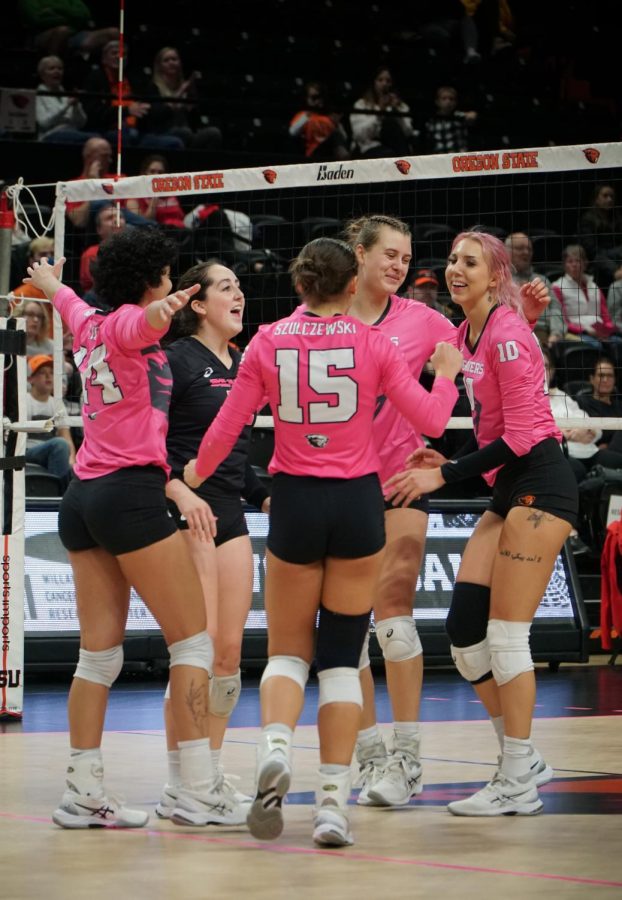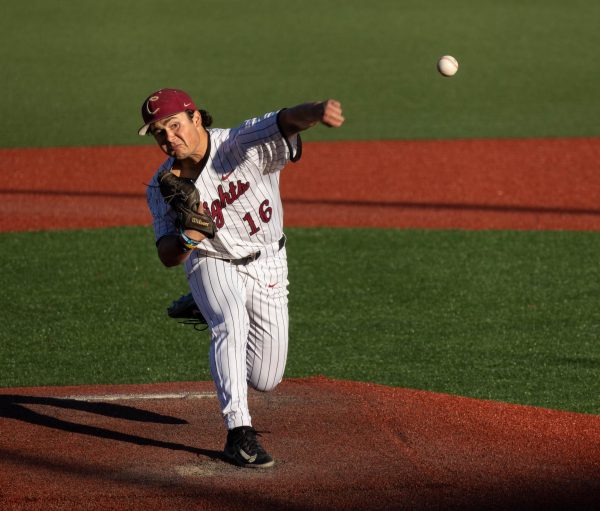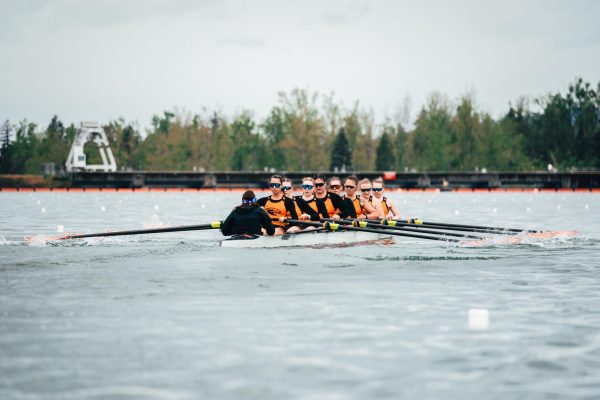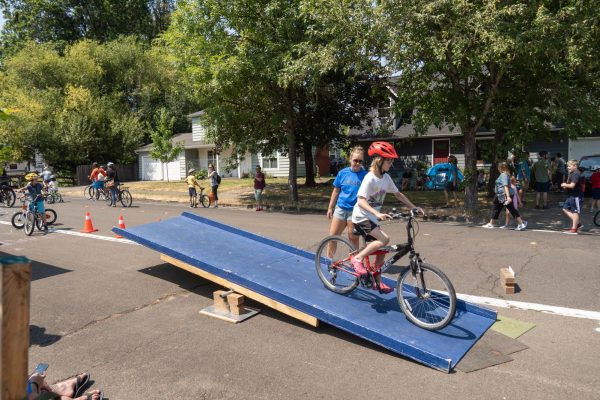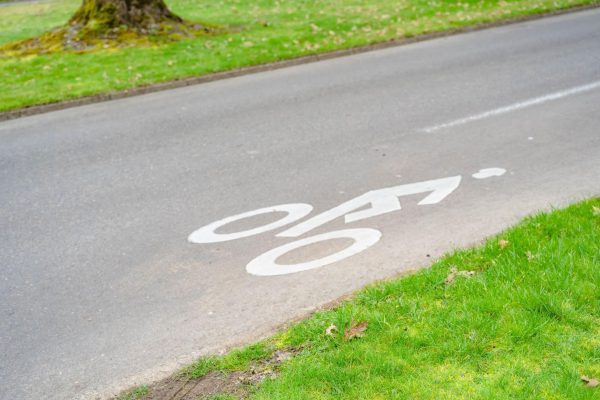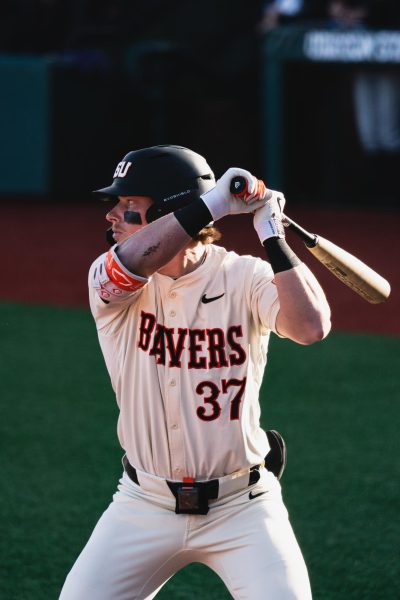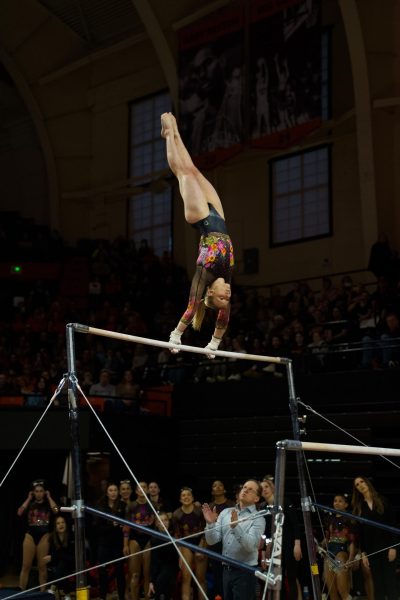‘I didn’t think I would leave that country,’ OSU international athletes share perspectives
The volleyball team celebrates after scoring a point against Utah on Oct. 23. The Beavers are 7-13 currently on the season.
October 24, 2022
It’s one thing to move across the country to play a sport you love, but what about moving across the world? International athletes moving to the United States for sports is growing more and more common and has been mostly observed in sports such as soccer or basketball. When taking a look at Oregon State’s women’s volleyball roster, there are six players whose hometowns reside outside of the U.S. For many of these athletes, coming to the U.S. was the next step in their athletic careers.
Senior setter Inna Balyko had two choices after her last season of club volleyball in Russia: to either continue at a professional level or to travel to the U.S. to not only continue her volleyball career but to also receive an education.
“When I was 13 I moved to a city by myself,” Balyko explained. “Since 15 I was being really independent and deciding on my own what I want to do. I just came to [my parents] and told them I wanted to go to America.”
This experience, however, is not unique to Russia. Ukrainian outside hitter Kateryna Tkachenko was also faced with the same decision.
“Well, my season in the Ukrainian Super League finished because of COVID. I had two choices: to go play professionally in Europe or go to the U.S.,” Tkachenko explained. “It’s a nice ability that you can combine everything; you can get that high education here and play at a pretty high level at the same time, which is kind of hard to do in Europe.”
Many of the six international students on the OSU women’s volleyball team learned English for the sole purpose of coming to the states. In fact, according to head coach Mark Banard, to come to the states, you must pass an English Proficiency Test to enroll. Due to many of these athletes not knowing whether or not they would end up in the U.S., many of them had limited time to learn.
“[My parents] were kind of doubting that I could learn English in six months because I didn’t know anything,” Balyko explained. “We had it in school but I never thought I would need it; I didn’t think I would leave that country.”
“I personally was forcing myself to be with Americans more so I can listen in more and kind of get used to it even though sometimes I wouldn’t understand anything. I needed to be in the environment to get used to it.”
Middle blocker DiLara Ünal speaks almost exclusively Turkish which one may assume would lead to miscommunications when on the court. However, on the court isn’t where the difficulty lies when she explains that the most difficult part is simply not being able to successfully voice any thoughts or opinions without fear of being misunderstood.
“Actually I didn’t know much English before I came here,” Ünal said. “I only knew simple things as taught in my country.”
Learning a new language while living in that country is hard enough, but with no family or friends from home around it can be even more difficult.
“In fact, I can say that the biggest problem of distance is longing,” Ünal explains. “There is quite a distance between Turkey and USA. There is also a 10-hour difference. My speaking time is limited so I miss it more.”
While some athletes, like Tkachenko’s family, have moved to the states, others don’t have that same luxury. COVID as well as other events have resulted in travel being disrupted. For Balyko, she hasn’t been back home in about two years.
Coach Banard has been making efforts not only to bring the team together but also to help share the diverse cultures and languages the team has to offer. The Monday after Thanksgiving, the team holds a Friendsgiving where everyone brings a dish and the international players bring something from their home country.
“I feel like it’s a good thing for even Americans to kind of learn about different cultures too,” Balyko said. “I like to have a diverse team and I like personally learning to like different cultures like Turkey and other countries and their favorite food and all of those things.”
“My transition was difficult at first. You know, it was difficult for me to get used to a different country, a different language, and different culture but as time passed I got used to all of them. My teammates and coaches always helped me in this process.”












































































































